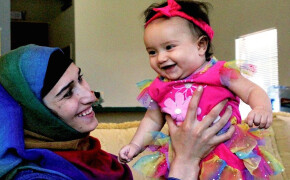Gateway of Grace

“V. Let your way be known upon earth;
- Your saving health among all nations.
- Let not the needy, O Lord, be forgotten;
- Nor the hope of the poor be taken away.”
(from The Book of Common Prayer, p. 98)
In the New Testament, Jesus expands the concept of "our neighbor," to include anyone with whom you might come into contact. Our neighbors in Dallas come from all four corners of the globe and for many different reasons. The political, social, and religious climates of countries like Afghanistan, Eritrea, Palestine, Syria and so many others have brought many people to our city as refugees and asylum-seekers. They are looking first and foremost for a place to be and remain alive.
Whether it is war or famine, violence, threat or natural disaster that has caused Newcomers to seek out Dallas, they are here because they must go somewhere, though many of us have never bothered to ask "why?" They are lumped under the one name of “refugee” and old names are left behind, forgotten or erased. At our borders, some are quite literally given the last name FNU—Family Name Unknown—and a birthdate of January 1. It does not matter that in their countries they were doctors; here they will be the night watchman, or the cell phone factory worker. Here they will be anonymous.
For a time, that is. Part of what we do at Gateway of Grace, and particularly in the ESL school where I teach, is to give women, men and children their names back, to help them break out of anonymity and thrive in the U.S. To learn their names, the real ones, takes work, but the look on a woman’s face when she hears her name from an American who is not even her teacher—she, who may not ever hear her name outside the home— has her smile light up the room. To have a name is to have dignity, and to hear yours is to be reminded of this.
So we say the names of our new neighbors, but we also help them into other, new names they may not have had before: “mother,” “barista,” “neighbor,” “citizen.” We throw our new friends baby showers, help them fill out job applications, teach them American cultural practices and help them study for the citizenship test. We also give them access to the English language, which helps these Global citizens feel like they are participating in local life in Dallas, instead of feeling on the margins because of gaps in communication.
Learning English is arduous and not for the faint of heart, but fortunately it is often fun. We begin by playing bingo using the names of fruits, and in time graduate to laughing in our conversations. A student once told us a great story about riding monkeys in Afghanistan; she meant “donkeys.” Another told us, when we were learning the idiom “deer in the headlights,” that he had definitely seen that look before when he hit a camel on the way to Jericho - which, for the record, lived to face another day.
While life in a new place, with a new language, new calendar and new everything, is by no means easy, these people have something else in common besides their hardship. So often, they come uncertain but full of hope, even naming their children the equivalents of our word “hope” in Dari and Pashto. Our calling as Christians is to nurture the hope of a future for our English students. The students have lost community, family, identity and their mother tongue being the spoken language at the grocery store. We minister to these needs for belonging and acceptance in so many ways at Gateway of Grace as we journey together. In this sense, my students are my fellow travelers. We ultimately seek the peace that was and is and will be found in Jesus. We hope together for a better world, and anticipate the day that this one—every nation, no exceptions—will be restored.
Kristen Gunn is working with Church of the Incarnation’s long-time partner, Gateway of Grace, as part of her Uptown Fellows workforce placement.

